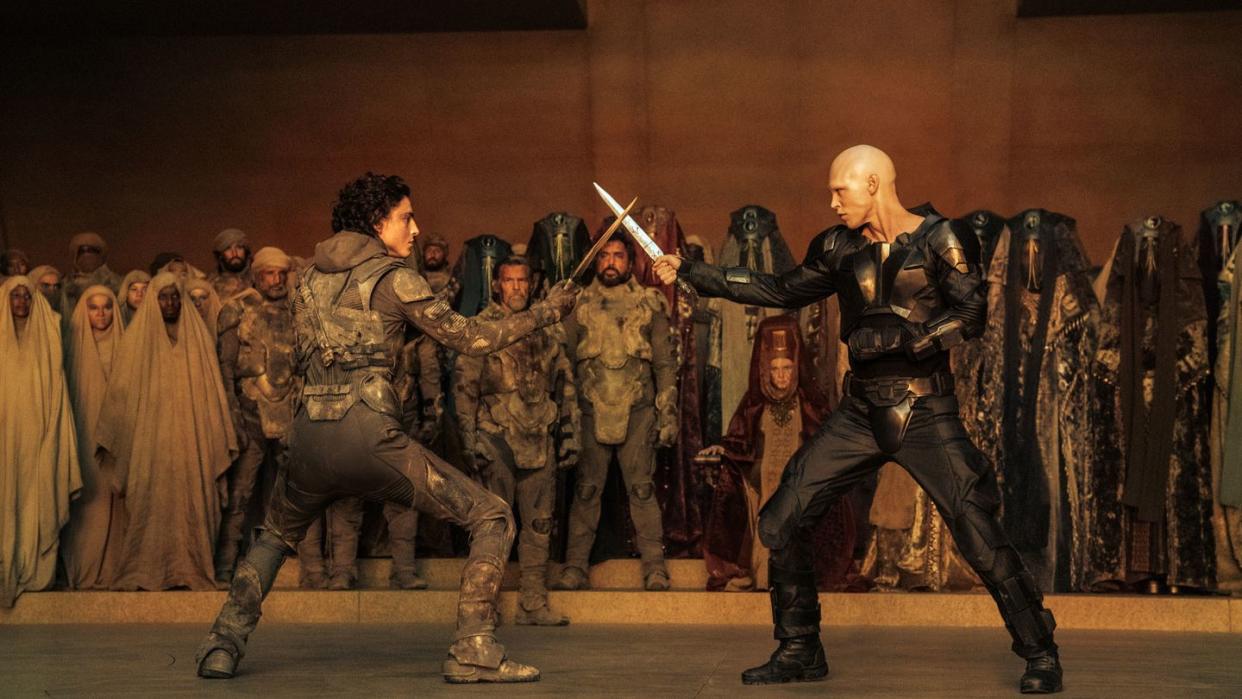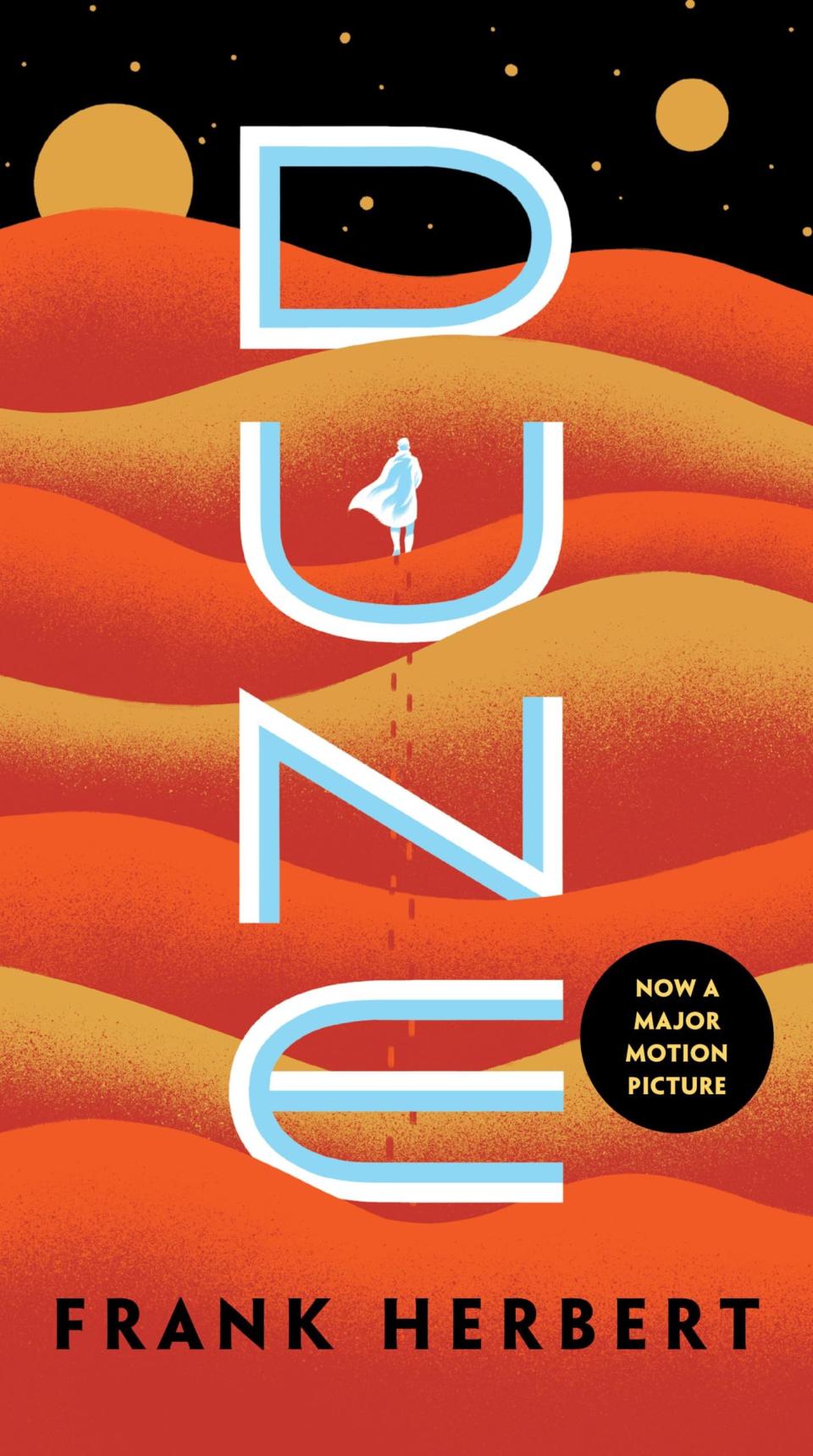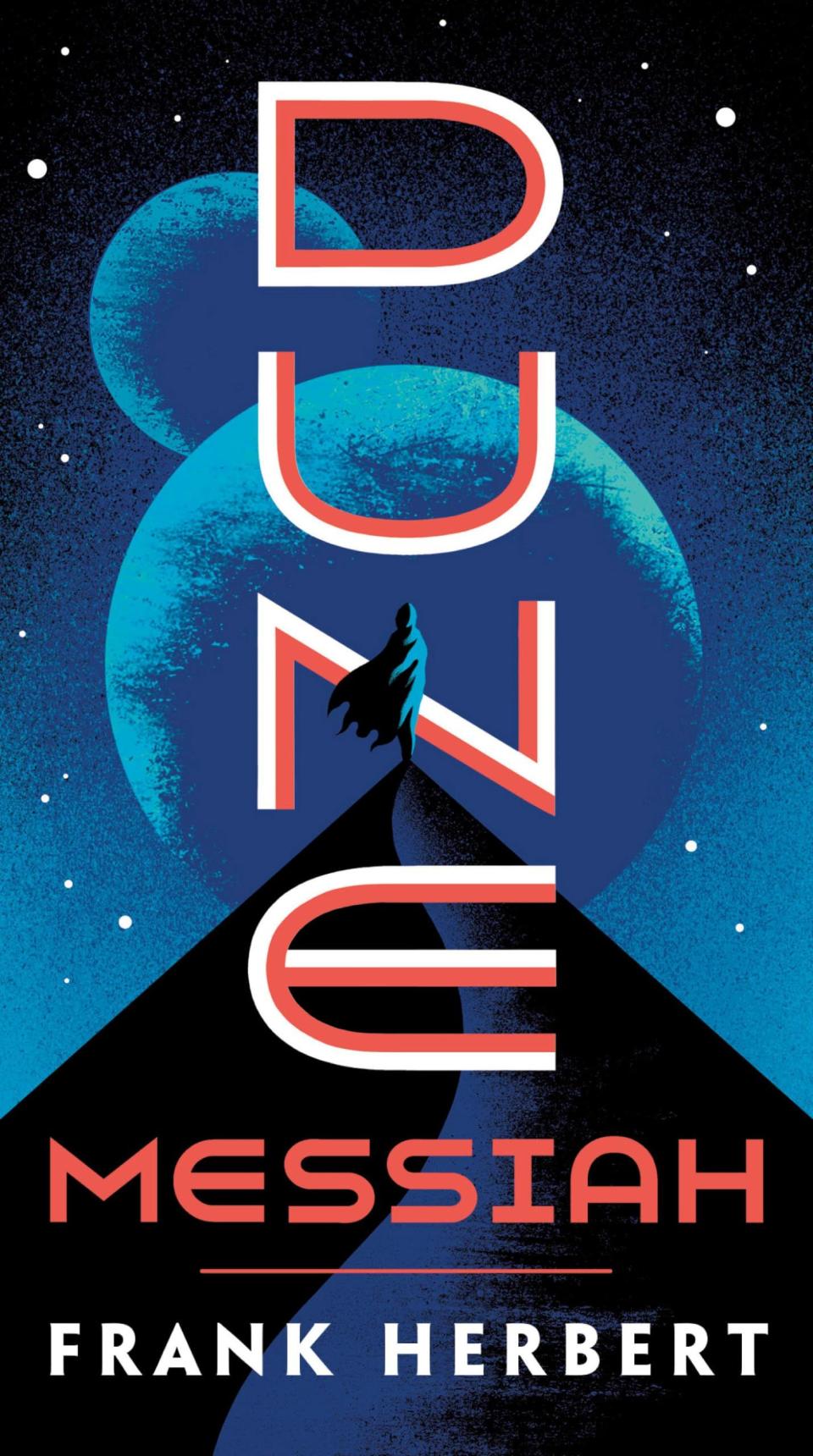The Ending of 'Dune: Part Two,' Explained

- Oops!Something went wrong.Please try again later.
- Oops!Something went wrong.Please try again later.
"Hearst Magazines and Yahoo may earn commission or revenue on some items through these links."
This story contains spoilers for Dune: Part Two and Dune Messiah.
Dune: Part Two may very well be the defining sci-fi epic of the 21st century, but it’s not exactly a feel-good movie—especially the ending. If you’re not familiar with Dune, then the vibes at the end might be a little confusing. We’re supposed to be happy that Paul Atreides (Timothée Chalamet) and the Fremen win, right? Well, not really, but those mixed feelings are all part of the spicy cocktail of the saga of Arrakis.
Like the original Frank Herbert novel, the twisty brilliance of Denis Villeneuve’s Dune: Part Two is this: although it's structured like a hero’s journey, that hero becomes a villain at the eleventh hour. In many ways, Villeneuve crystallizes Herbert’s intentions, perhaps somewhat better than Herbert did. “Frank Herbert didn't want to do a white savior story,” Villeneuve recently told Hoi-Tran Bui at Inverse. “He wanted to do the opposite.” And yet, for decades, there has been debate on just how well the first Dune book (which Part Two completes) communicates a subversive message. As science fiction historian Alec Nevala-Lee said in 2022, “If Frank Herbert was trying to criticize the white savior narrative in the first Dune, he probably could have done a better job.”
So if you’re confused or locked in a debate about the ending of Dune: Part Two, that’s okay. This conversation has been happening since the late 1960s, and the reasons for the turmoil are completely explicable. Here’s how we got here, why there’s controversy, and what the ending of Dune: Part Two really means.
Dune: Part Two ending, explained
In the final moments of Dune: Part Two, Paul Atreides does two shocking things: he says he’ll marry Princess Irulan (Florence Pugh), and then, he sends his Fremen troops out into the universe to start a holy war against the great houses. This is the horrific future vision that Paul has been seeing since Dune: Part One. The Fremen and House Atreides prevail on Arrakis, but the cost is a massive war that will burn half the universe. Let's break down how this happens.
Why does Paul marry Irulan?
Why does Paul need to marry Princess Irulan to take over the throne from Emperor Shaddam IV? Because he has control of the spice on Arrakis, couldn’t he just kill everyone and marry Chani, his true love? The answer lies in the book. When Paul sees Irulan in the final pages of the book, he thinks, “There’s my key,” and on the very last page of the book, he tells Chani, “We must obey the forms.” This means that he wants to gain power within the system.
In the book, we learn that a deal has been made to “place a Bene Gesserit on the throne, and Irulan is the one they’ve groomed for it.” In the movie, before everything goes down in the end, Reverend Mother Gaius Helen Mohiam tells Irulan that “there’s one way your family can remain in power… are you prepared?”

amazon.com
$8.99
Paul is somewhat aware of this, so in marrying Irulan, it not only gives him control of the throne, but it placates the Bene Gesserit, too. It’s clear at the end of the movie that the Bene Gesseirt foresaw Paul in power as an acceptable option, which is why Irulan says, “Spare my father and I’ll be your willing bride,” and why the Reverend Mother Gaius Helen Mohiam says, in a burn reminiscent of Royal Tenenbaum: “There are no sides.”
So Paul marries Irulan for political protection from both the Bene Gesserit and the royal court, and Irulan’s motivations are basically identical. She will end up falling in love with Paul, but that’s not until the end of the second book, Dune Messiah. For now, this is a political decision—one that is obviously heartbreaking for Chani. But it’s more than just a break-up between Chani and Paul. Throughout the entire movie, Chani has been worried that Paul would colonize the Fremen through religious propaganda, so when it actually happens, she’s furious. This is a big change from the book, but it’s also a change that clarifies Herbert’s intent. We need to see that Chani is not okay with this; otherwise, the anti-white savior narrative gets lost.
Why does Paul declare war on the great houses?
At the end of Dune: Part Two, Paul is told that the Great Houses of the Landsraad—the assembled representatives of other planets in orbit—“refuse to honor your [Paul’s] ascendency.” This is a tiny change from the first book, but it does reference the slightly apocryphal 1984 book The Dune Encyclopedia, in which it's stated that the Landsraad wanted to overthrow Paul fairly quickly. In Dune and Dune Messiah, we don’t actually see “Muad'Dib's Jihad”—although the implication is that nobody was happy with it, as it sent Fremen warriors to take over basically every planet in the known universe. In Messiah, set twelve years after Dune and the conclusion of the “holy war,” there’s a conspiracy to assassinate Paul, who’s essentially become a dictator. So, having Paul declare war on the Great Houses at the end of Dune: Part Two checks out with the events that happen off-stage in between the first and second books.
The real question is: could Paul have averted the holy war? Why did he let the Fremen become so extreme? The short answer is a bit meta-textual. This happens because Frank Herbert was trying to make a point: As Herbert put it: “I wrote the Dune series because I had this idea that charismatic leaders ought to come with a warning label on their forehead: ‘May be dangerous to your health.’”
Interestingly, the political leader who Herbert felt was the most emblematic of this tendency was John F. Kennedy; someone, who, like Paul Atreides, was outwardly likable and charismatic. This, Herbert felt, was bad for society in the long term, because people tend not to question charismatic leaders, so Paul’s holy war is a hyperbolic example of just how wrong that kind of thinking can go.
Okay, but is Paul really the bad guy?
If you dip into Twitter, you’ll find plenty of discourse about whether or not Paul is truly the villain of Dune. On the one hand, some folks seem to be celebrating Paul’s victory; on the other hand, plenty of people are posting Frank Herbert quotes (or memes), which make it clear that this wasn’t the intent. If you type “Is Paul the Bad Guy” into the search function on Twitter, you’ll see a lot of people are very upset about this. On the one hand, it’s tempting to side with the people who are right here: misreading the ending of Dune is simply that, a misreading. And yet, historically, this confusion is not remotely new.
In fact, within the text of Dune, it’s actually somewhat understandable as to why people could still be debating Paul’s character, sixty years later. For the first two-thirds of the story of Dune—both the novel and the two Villeneuve movies—we’re rooting for Paul. And then, suddenly, we’re not. The ending of Dune, then, is a bit like the ending of Attack of the Clones; yes, Anakin ended up winning, but the path to war and horribleness has begun. In his 1988 book, Frank Herbert, scholar William F. Touponce described the weird feelings we all have about Paul as “a tension between two different versions of Paul.” His basic point is that within the first Dune book, the critique of the hero’s journey and Paul himself requires the reader to work for that message. Because Herbert claims he intended to critique the hero’s journey by “our participation in it,” any explicitly negative reading of Paul, in the book, requires, as Touponce puts it, for the readers to figure it out on their own: “...it is we as readers who have to formulate the implicit criticism of what lies behind these negations. It has been left largely unformulated—at least in this first volume [novel]—though nonetheless intended.”
This is what Nevela-Lee meant when he said Frank Herbert “could have done a better job” with his message. Dune scholar Haris Durani also has noted that the danger of the subtlety of the first book means that in criticizing various tropes, it also “reinscribes” some of the exact things it’s supposedly criticizing. In fact, historical evidence indicates that the first editor of Dune—sci-fi magazine mogul John W. Campbell—viewed the story as a “swashbuckler.” Before Dune became a full novel in 1965, it was serialized in eight parts in the pages of Analog, starting in 1963. In all the letters between Herbert and Campbell, there’s no discussion about whether or not the first three-part serial, “Dune World,” was subverting the hero’s journey.

amazon.com
$8.29
Campbell was so unaware of Herbert’s intended extra-textual message that when the author tried to serialize the sequel, Dune Messiah, a few years later, Campbell rejected it outright, telling Herbert’s agent, Lurton Blassingame, that science fiction readers “want heroes, not anti-heroes.” Basically, the first person who published and edited Dune in magazine format totally missed the point.
From that point on, if readers never read Dune Messiah, it was possible to have a very mixed interpretation of what the story was really about. Even in 1984, Francesca Annis—who played Lady Jesssica in David Lynch’s film adaptation—said she felt that Dune’s politics were the opposite of her own: “in a way it’s a very right-wing story… it’s just one group of powerful people triumphing over powerful people.”
Based on the script of the 1984 movie, you could read Dune as an apolitical story, or at the very least one that totally let Paul off the hook. And in sense, although it wasn’t his intent, Frank Herbert did let Paul off the hook a little bit in the first book, too. To combat this, Dune: Part Two takes elements from Dune Messiah (and Herbert’s stated purpose) to make the impact totally clear. Paul’s “narrow way through” to lead his family and the Fremen to victory has resulted in him living long enough to become the villain. Ultimately, Dune contains huge lessons about how we can think about a better future. But Paul’s path to power isn’t an instruction manual—it’s a warning.
You Might Also Like

